May 18 Foundation: Bringing the Truth of May 18 to Light
By the Gwangju News Team
The May 18 Foundation was founded in 1994 in order to help develop Korea through the spirit of struggle and solidarity of the May 18 Democratization Movement or Gwangju Uprising. Through various projects, the Foundation is committed to sharing the history of the May 18 Movement and its impact as the “foundation of democracy in Korea” at a national level, though it also promotes democracy and human rights at a global level. We meet Mr. Won Sun-seok, the chairperson of the May 18 Memorial Foundation, where he shares his personal account of the May 18 Democratization Movement, the Foundation, and his hope for the future.
Gwangju News: Thank you for taking the time to do this interview. Could you please describe the May 18 Democratization Movement or Gwangju Uprising to our readers?
Won Sun-seok: On April 9, 1980, before the Gwangju Uprising, the Chonnam National University Student Council was launched by electing a student council president along with student presidents from each college through a direct system for the first time in the country. The Chonnam National University Student Council held a grand gathering for democratization and the people for three days from May 14–16 of that year. University professors, high school teachers, students, and citizens in Gwangju participated in this democratization rally. On May 16, they decided to conclude the gathering with a torchlight procession and to observe the development of the government’s measures. However, the military government trampled on our wishes, expanding martial law nationwide, and began to kill people in Gwangju, which led to the outbreak of the uprising.
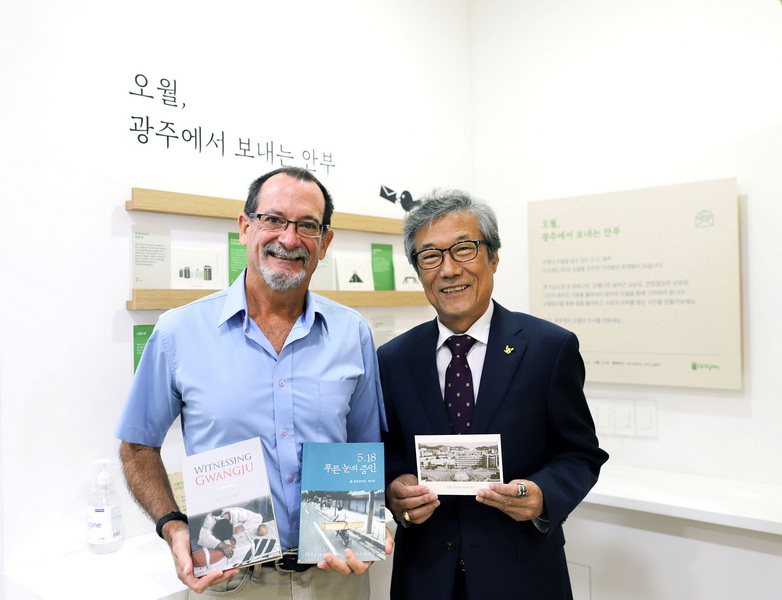
GN: What have you been doing personally (or with others) to promote the spirit of the Gwangju Uprising since the 1980 incident?
Won Sun-seok: After the Gwangju Uprising, I was arrested, taken to the security forces, and tortured for three days. As for the degree of torture, as many others have described, everyone, including me, suffered similar tortures. Afterwards, I was transferred to the Sangmudae Military Prison, where I was investigated and treated in an extremely inhuman way. I was released on October 26, 1980, four months after the Uprising, though I was sentenced to two years in prison and three years’ probation by a military tribunal. Many other participants in the Uprising were also released with me. We decided not to stay silent. For example, the Chonnam National University student council formed a group called “People’s Wave” (minjung pado, 민중 파도) to fight against the military government. Two years later Park Gwan-hyeon, the student council president at the time of the Uprising, passed away after fasting a long time in prison. I established the Park Gwanhyeon Memorial Group to continue his legacy and relocate his tomb to the May 18 Cemetery. To this day, I am restraining myself to live my life in a proper way while maintaining and promoting the spirit of Gwangju.
GN: Please tell us how the May 18 Memorial Foundation was established.
Won Sun-seok:In 1993, the government began to carry out compensation for the victims of the Gwangju Uprising for the second time. The May 18 Uprising Participants’ Association initiated the movement to establish an official organization with a part of the compensation money and contributions of regular citizens and overseas Koreans. We had our first meeting on November 18, 1993, and started a fundraising movement: more than 1 million won from many victims who got directly involved in the May 18th movement and more than 100,000 won from other citizens or overseas Koreans. The following year, on August 30, 1994, an inaugural general meeting was held for the establishment of the May 18 Memorial Foundation with about 350 million won based on the contribution of one million won. The participants of the movement unanimously elected Father Cho Pius (Cho Cheol-hyeon) as the first chairperson. On December 22, 1994, we received the certificate of the Ministry of Home Affairs affirming us as the May 18 Memorial Foundation (No. 94-3).
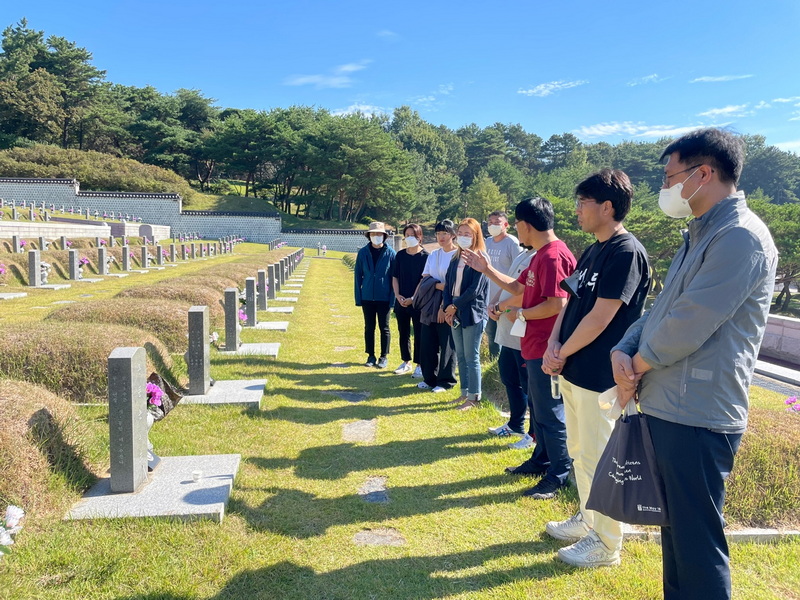
GN: Could you briefly explain the May 18 Memorial Foundation and its function?
Won Sun-seok: Since its establishment in 1994, the Foundation has inherited and developed the spirit of the May 18 Democratization Movement and steadily and firmly grown in size. We currently have 30 staff members. As of January 2023, the Foundation is comprised of six offices: the Administrative Support Office, the Planning and Public Relations Office, the May 18 Glocal Center, the May 18 School, the May 18 Cultural Project Group, and the Truth Records Department, in addition to the May 18 International Research Institute under the board of directors.
We currently run diverse projects. For example, we provide counseling services to those who have suffered from illness or disease. We also have scholarships for democracy and human rights activists. We carry out the May 18 Awareness Survey, the May 18 Marathon, and other public relations projects. Our projects go beyond the national level with diverse international projects, such as the Gwangju Democracy Forum, the May 18 Academy, and our responses to global human rights issues, such as the political situation in Myanmar, while promoting international solidarity. We also promote democracy and human rights around the world with our award projects such as the Gwangju Prize for Human Rights, the May 18 Press Award, the May 18 Literature Award, and the Hinzpeter International Press Award. Educational projects are also important, which include training for youth, citizens, and teachers, the production of textbooks and other educational contents, the May 18 Exhibition, and the operation of May 18 Road. We are also engaged in academic projects such as the establishment of the May 18 School, academic conferences, the May Memory Forum, a research paper contest, and exchanges for young researchers. Our archives project handles the collection and management of May 18 records and the production of new contents. We also carry out May 18 distortion monitoring and legal response through our truth sharing project. The members of the May 18 Foundation are proud of our role as a civil society organization representing the May 18 Movement, while doing our best in furthering the spirit of May 18 and commemorating projects, and in responding to the interests of the people through all the know-how accumulated over the past 30 years.
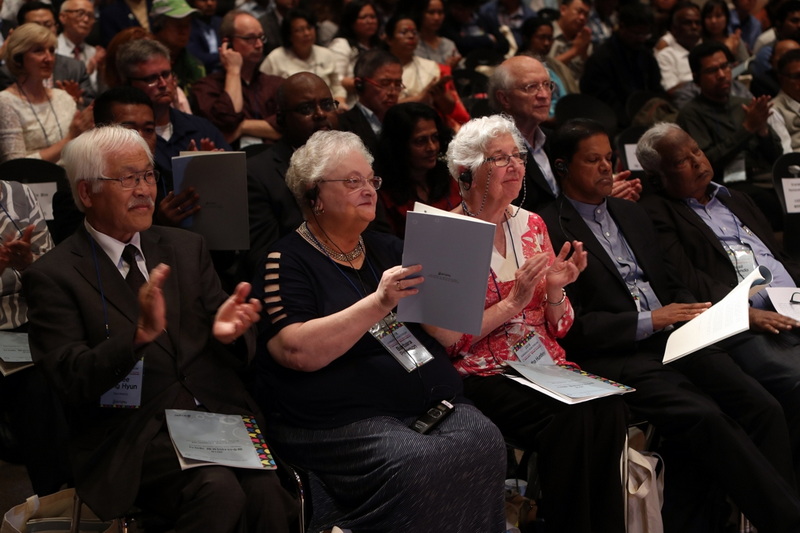
GN:Would you please introduce the projects of the Foundation to our readers – those that are local, national, and also international in nature? Please also explain the meaning and effect of the projects.
Won Sun-seok: Although the Foundation is based in Gwangju, it aims to share the value of the May 18 Democratization Movement with people at local, national, and international levels. The success of the spirit of May 18 has been a foundation and driving force for people’s movements to improve democracy and human rights in Korean society. Recently, the May 18 Democratization Movement has become known to the people of the world. The movement of the people was considered as a failure originally at the time of the Uprising in 1980, but it has become a model for successful civilian revolutions since. Based on our experiences, we are hosting diverse events and projects to share the experiences in Gwangju with the people around the world with the hope that they can get inspired and encouraged while carrying out their missions, some which may seem to be impossible to accomplish at the moment. In other words, I strongly believe that the May 18 Democratization Movement is sending a message of encouragement to the people of countries that have gone through similar experiences of militarism and authoritarianism: Their courageous movements will eventually change the world. In the midst of a global crisis of democracy, we are obliged to show more solidarity with the world based on our experiences of May 18. In order to fulfill this role, we are actively carrying out monitoring activities and solidarity activities for democracy and human rights around the world.
GN: Could you introduce a couple of the most successful achievements in promoting the spirit of May 18?
Won Sun-seok: The May 18 Foundation is conducting many successful projects. All of them are equally important, but we would like to introduce two of them that have been going on for a long time. The Gwangju Democracy Forum (GDF, formerly the Gwangju Asia Forum, renamed in 2021), which started in 1999, is an annual international forum held every year on May 18. It is a forum for democracy and human rights advocates, activists, and researchers who continue to discuss the current state and challenges of democracy and human rights at the regional, national, and global levels to come together in solidarity. The Gwangju Democracy Forum is cooperating with the international community by setting a practical agenda for realizing countermeasures through sharing various experiences and opinions in the context of deepening challenges to democracy worldwide. The Gwangju Prize for Human Rights was established in 2000 to commemorate and inherit the spirit of the May 18 Democratization Movement, awarding individuals or organizations who have devoted themselves to democracy and human rights. The Special Award added in 2011 aims to recognize the people (and organizations) that have contributed to the promotion of democracy and human rights in the fields of culture, art, media, and academia every two years. The Gwangju Prize for Human Rights Ceremony is held annually on May 18. The Foundation is also responding quickly to international human rights issues by sharing information through solidarity activities with awardees and their organizations.
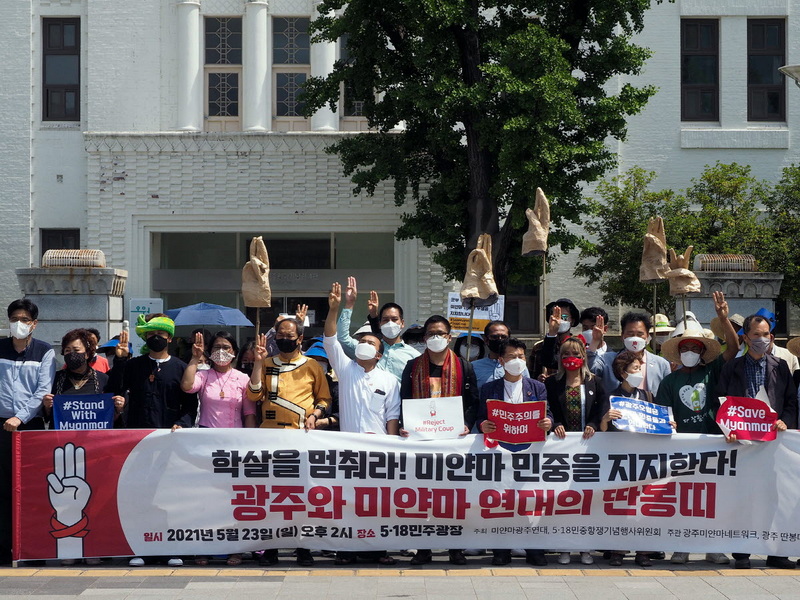
GN:Do you also carry out projects to support overseas human rights activities?
Won Sun-seok: The experience of the May 18 Democratization Movement should serve as a valuable source of nourishment for promoting democracy and human rights at a global level. The people were isolated from the outside world by the military regime during the period of the Gwangju Uprising. Our fight for democracy, truth, and people’s honor would have failed but for the solidarity of those outside Korea who showed their solidarity with the May 18 Movement, Gwangju, and the Republic of Korea. Those of us who have received such help should not overlook the various requests from likeminded people around the world who want to join hands with us. Since the beginning of the Foundation, it has promoted direct and indirect support and solidarity projects through various events. Depending on the circumstances, there have been times when direct support projects have been promoted, though we often failed to continue our support due to financial limitations. Starting this year, however, we are planning to establish the Gwangju Democracy Fund to play more active roles in globalizing, forming solidarity, and promoting democracy and human rights by supporting democracy and human rights movements at the global level. The Fund will carry out fundraising from May this year, and it will manage the May 18 Glocal Project to support international projects based on the spirit of May 18, the May 18 Grassroots Project to support the projects of overseas democracy and human rights organizations, and the Gwangju Democracy Fund Emergency Support for urgent international relief. These three projects will support our efforts to enhance our solidarity with the world.
GN: How are you responding to cases that distort the truth of the Gwangju Uprising? Do you work with other organizations at home and abroad on historical distortions?
Won Sun-seok:Forty-three years have passed since the May 18 Democratization Movement took place. However, cases of distorting the truth with malicious intent continue to occur in ridiculous ways. For example, some people disseminate the disinformation online, in books, and on TV that the Gwangju Uprising was instigated and spread by North Korean military intervention despite the Special Act on the May 18 Democratization Movement, which prohibits the distortion of the May 18 Movement. In particular, the Foundation is taking strict measures against distortions of May 18 by celebrities for political use, which produce a large-scale negative impact. For example, the Foundation successfully applied for a provisional injunction to prohibit publication and distribution for Chun Doo-hwan’s memoirs. Recently, we also successfully filed and concluded a lawsuit against Jee Man-won for defamation based on his allegation of the involvement of “North Korean Special Forces.” We are also requesting public libraries across the country not to keep or lend books that distort the truth. We are also requesting the Korea Communications Commission to delete posts in which we find distortions through our online monitoring. The Foundation has carried out these activities in close cooperation with Gwangju Metropolitan City, which continuously supports the activities of the Foundation.
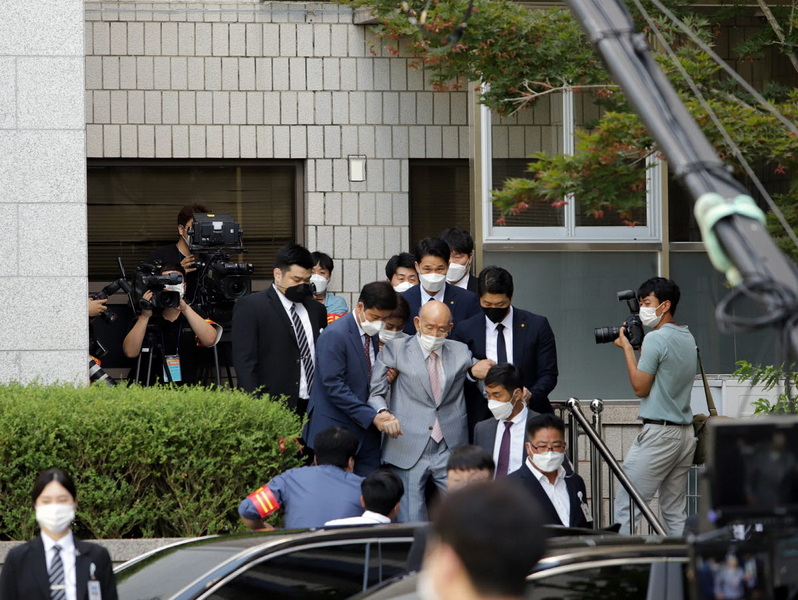
GN: Chun Woo-won, the grandson of late Chun Doo-hwan, called his grandfather a slaughterer on his Instagram account. He also visited the May 18 National Cemetery and apologized to the bereaved families on March 31. Why do you consider this incident significant?
Won Sun-seok:Among Chun Doo-hwan’s family, Chun Woo-won was the first to apologize for the May 18 massacre and visit the May 18 Cemetery. Chun Doo-hwan has already passed away, so he can no longer be held accountable for his crimes. His grandson helped to confirm the fact that history would not forget the crimes of state violence. The Foundation has some reservations about this incident, which can be an expression of transient emotion. However, his apology can be so much more meaningful if he continues to show the will to apologize with his actions. In this regard, we plan to watch and help him in diverse ways. Everyone knows that historical scars cannot be healed easily with just one person’s apology. However, I really wish that he can continue his sincerity through continuous actions, which will also help the investigation of May 18. I hope that Chun Woo-won’s apology will be followed by a confession of conscience from numerous others, including soldiers who committed wrongdoings in Gwangju in 1980, especially those who were in higher positions. I also hope that the actions of this young man named Chun Woo-won will serve as an opportunity for other young people living in this era to accept the spirit of the May 18 Democratization Movement into their hearts.
GN: Finally, could you share the future plans of the May 18 Foundation with our readers?
Won Sun-seok:The May 18 Memorial Foundation plans to expand its contribution at a global level. The Foundation was registered as an NGO at the UN Economic and Social Council in 2021. The May 18 Memorial Foundation has been enjoying a significantly higher amount of recognition along with the May 18 Democratization Movement in the Asian region, unlike in the past. Now we are ready to play more active roles in the wider international community in connection with the United Nations. The Foundation will utilize its International Research Center and Glocal Center to share the May 18 model in overcoming the past legacy of authoritarianism while further deepening and expanding the May 18 spirit as a core value of democracy in the Republic of Korea. At the national level, one of the most important roles of the Foundation is to sublimate the May 18 spirit into a sustainable energy by including it in the preamble of the Constitution through a constitutional amendment.
Photographs courtesy of the May 18 Foundation.
Translated by Dr. Shin Gyonggu.






